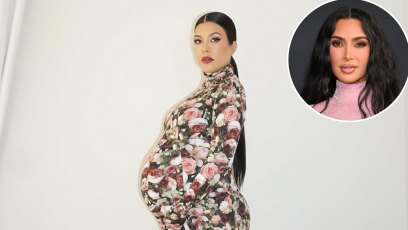
Getty Images
Which Fad Diets to Stick to and Which to Skip While Making Your New Year’s Resolutions (EXCLUSIVE)
It’s no surprise that our favorite celebs love to spill their diet secrets, given that they often work so hard to get those killer bodies! Now that the new year is quickly approaching, so you might be looking to stars to figure out how to get the body of your dreams. But how safe (or beneficial) are those weight loss remedies that aren’t, you know, sweating it out at the gym?
We talked with Dr. Josh Axe, D.N.M., C.N.S., D.C., founder of DrAxe.com, best-selling author of Eat Dirt, and co-founder of Ancient Nutrition, to get the truth about some of the Internet’s most searched diets — and whether you should listen to the hype! Scroll down to hear his thoughts on apple cider vinegar, the bone broth detox, and more popular fads.

The apple cider vinegar diet is huge right now. Does it actually have any health benefits? If someone decides to try it, how often should it be consumed?
Whether you’re dieting or not, regularly having small amounts of apple cider vinegar, or ACV, has numerous health benefits, including: better digestion, reduced acid reflux, enhanced detoxification, and blood sugar regulation. ACV contains a powerful substance acetic acid, which is beneficial for gut health and more. In terms of it being used as part of a diet to help someone lose weight, this approach might have certain advantages due to how ACV can help reduce cravings and improve nutrient absorption.
I’d recommend starting with one or two teaspoons of apple cider vinegar mixed with water before your three biggest meals of the day, as this may help stabilize blood sugar levels, alkalize your digestive system and have other positive effects on your metabolism. You can also try starting the day with a cleansing mix of ACV, lemon juice, cayenne pepper, and cinnamon. I’m a big fan of ACV, but I still like to remind people that there’s no magic bullet when it comes to lasting weight loss. In general, consuming lots of one healthy ingredient should never take the place of an overall balanced diet and healthy lifestyle.
Celebs like Kourtney Kardashian follow the bone broth detox, which means that for one day each week she drinks just water and bone broth. Is it healthy to fast one day per week?
Fasting (abstaining from eating solid food) may seem like a recent trend, but in fact, it’s been practiced safely for thousands of years. As long as it’s not causing any negative side effects —
such as irregular menstrual cycles, lots of fatigue, or heavy brain fog — then going for longer periods of time without food, even for an entire day, has been shown to have certain positive health effects.
Skipping a whole day of eating obviously has benefits for reducing calorie intake as well, but this isn’t the only reason that fasting is helpful for weight loss or maintenance. Fasting helps deplete glycogen (energy stored in muscles), which means the body uses more stored fat for energy, plus it helps normalize blood sugar levels. It may also help regulate production of certain appetite hormones — including leptin, the hormone that regulates fat storage in response to eating, and ghrelin, a hormone that increases hunger. Studies have also found links between fasting and longevity, due to how fasting may help lower oxidative stress. Bone broth is one of the best things to have while fasting (as well as on non-fasting days) because it prevents muscle wasting or dehydration, and supplies essential nutrients including amino acids and electrolytes to keep energy levels up.
Snooki and Elizabeth Hurley have spoken publicly about eating only one meal a day. Could that, in fact, be detrimental to your health?
Eating “3 square meals a day” might be most common, but that doesn’t mean it’s the only healthy way to eat. In fact, it’s now being shown in studies that for some people, eating many small meals all day long (also called “grazing”) may contribute to overeating, possibly because it never allows enough time for someone to feel truly hungry, decreasing their ability to be stay in touch with their true hunger versus fullness signals.
Everyone is a bit different in terms of how often and when they get hungry, so there’s no hard-and-fast rule as to which number of meals is best. Eating only one meal per day might seem extreme, and it certainly can be very uncomfortable for some people, but for others it might provide substantial benefits and seem pretty manageable, especially if practiced only several days per week. Staying flexible and in touch with your appetite cues should really be the ultimate goal.
When Kim Kardashian was trying to lose her baby weight, she cut out sugars and carbs, but still ate meat and dairy. If someone is trying to shed pounds, should they aim to eliminate all sugar from their diet?
Eating plenty of protein, healthy fats, and veggies — while keeping carb and sugar intake low — is one of the most reliable ways to lose weight, often pretty quickly. Another name for a very low-carb, low-sugar diet is the Ketogenic Diet — which has recently become very popular, followed by celebrities such as Halle Berry, but has actually been practiced since around the 1920s. The “keto diet” works by forcing the body to burn fat for energy instead of carbohydrates, a process called ketosis.
Ketosis is only possible when carb intake is kept very, very low — around 25-30 grams of net carbs per day (the amount that’s left when fiber is subtracted). Foods like meat, fish, oils, and non-starchy veggies are either very-low carb or no-carb, so they should make up the bulk of calories on plans like the keto diet. Dairy products, grains, fruit, legumes, and added sugars have more carbs, so they are either strictly limited or avoided all together. Most people will be able to achieve similar results to Kim if they follow a “Moderate Keto Diet,” sticking to about 60-75 grams of net carbs daily which allows for a bit more flexibility.
Answers have been edited for length.








































